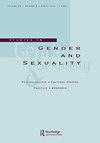同性恋的精神生活
Q3 Social Sciences
引用次数: 0
摘要
ABSTRACT 在印度当前印度教民族主义多数派的氛围中,LGBTQ 活动正日益通过效忠或抵制印度教印度暴力想象而得到重组。在公共自由不断缩减的大环境下,LGBTQ 活动在实现包容性公民权方面取得了一些进展,这导致了一种虚假而危险的关联,即印度教民族主义是对同性恋友好的。因此,一些 LGBTQ 活动家宣扬印度民族主义印度的 "同性恋民族主义 "愿景。这些 "同性恋民族主义 "叙事对其他许多不能或不愿融入印度教民族的 LGBTQ 活动家和社群施以暴力。通过对 LGBTQ 群体的实地调查,我在本文中阐述了印度同性恋民族主义的精神生活是如何植根于后殖民时代对定义 "真实 "民族主体性的焦虑之中的。在归属政治和拉康精神分析理论的基础上,我将民族主义对印度教身份的依恋与同性恋民族主义对同性恋身份的依恋相提并论。在此过程中,我认为对 LGBTQ 身份的焦虑依恋是同性恋民族主义渴望归属于(印度教)民族的根源。本文章由计算机程序翻译,如有差异,请以英文原文为准。
The Psychic Life of Homonationalism
ABSTRACT In the current atmosphere of Hindu nationalist majoritarianism in India, LGBTQ activisms are increasingly being restructured through their allegiance with, or resistance to, a progressively violent imagination of a Hindu India. Within a larger climate of shrinking public freedoms, LGBTQ activisms have made some gains toward inclusive citizenship, and this has led to a false and dangerous correlation that claims Hindu nationalism is queer-friendly. As such, some LGBTQ activists promote “homonationalist” visions of a Hindu nationalist India. These narratives of “homonationalism” mete out violence against many other LGBTQ activists and communities that cannot or will not be interpellated into the Hindu nation. Reflecting on fieldwork with LGBTQ communities, in this article I demonstrate how the psychic life of homonationalism in India is rooted in postcolonial anxieties of defining an “authentic” national subjectivity. Building on theories on the politics of belonging and Lacanian psychoanalysis, I draw parallels between nationalist attachments to Hindu identity and homonationalist attachments to gay identity. In doing so, I argue that an anxious attachment to LGBTQ identity is at the root of homonationalist aspirations of belonging to a (Hindu) nation.
求助全文
通过发布文献求助,成功后即可免费获取论文全文。
去求助
来源期刊

Studies in Gender and Sexuality
Social Sciences-Gender Studies
CiteScore
0.80
自引率
0.00%
发文量
15
期刊介绍:
Beginning in the final two decades of the 20th century, the study of gender and sexuality has been revived from a variety of directions: the traditions of feminist scholarship, postclassical and postmodern psychoanalytic theory, developmental research, and cultural studies have all contributed to renewed fascination with those powerfully formative aspects of subjectivity that fall within the rubric of "gender" and "sexuality." Clinicians, for their part, have returned to gender and sexuality with heightened sensitivity to the role of these constructs in the treatment situation, including the richly variegated ways in which assumptions about gender and sexuality enter into our understandings of "normality" and "pathology."
 求助内容:
求助内容: 应助结果提醒方式:
应助结果提醒方式:


